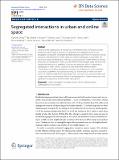Segregated interactions in urban and online space
Author(s)
Dong, Xiaowen; Morales, Alfredo J; Jahani, Eaman; Moro, Esteban; Lepri, Bruno; Bozkaya, Burcin; Sarraute, Carlos; Bar-Yam, Yaneer; Pentland, Alex; ... Show more Show less
Download13688_2020_Article_238.pdf (4.528Mb)
Publisher with Creative Commons License
Publisher with Creative Commons License
Creative Commons Attribution
Terms of use
Metadata
Show full item recordAbstract
Abstract
Urban income segregation is a widespread phenomenon that challenges societies across the globe. Classical studies on segregation have largely focused on the geographic distribution of residential neighborhoods rather than on patterns of social behaviors and interactions. In this study, we analyze segregation in economic and social interactions by observing credit card transactions and Twitter mentions among thousands of individuals in three culturally different metropolitan areas. We show that segregated interaction is amplified relative to the expected effects of geographic segregation in terms of both purchase activity and online communication. Furthermore, we find that segregation increases with difference in socio-economic status but is asymmetric for purchase activity, i.e., the amount of interaction from poorer to wealthier neighborhoods is larger than vice versa. Our results provide novel insights into the understanding of behavioral segregation in human interactions with significant socio-political and economic implications.
Date issued
2020-07-10Department
Massachusetts Institute of Technology. Media Laboratory; Massachusetts Institute of Technology. Institute for Data, Systems, and SocietyPublisher
Springer Berlin Heidelberg
Citation
EPJ Data Science. 2020 Jul 10;9(1):20
Version: Final published version